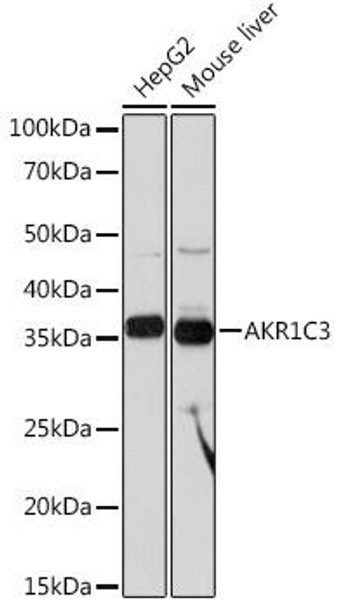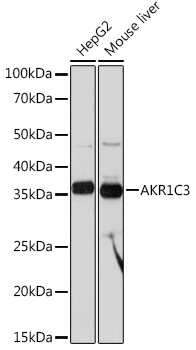Anti-AKR1C3 Antibody (CAB3884)
- SKU:
- CAB3884
- Product type:
- Antibody
- Reactivity:
- Human
- Reactivity:
- Mouse
- Host Species:
- Rabbit
- Isotype:
- IgG
- Research Area:
- Cell Biology
Description
| 抗体名: | Anti-AKR1C3 Antibody |
| 抗体コード: | CAB3884 |
| 抗体サイズ: | 20uL, 50uL, 100uL |
| 申し込み: | WB IF |
| 反応性: | Human, Mouse |
| 宿主種: | Rabbit |
| 免疫原: | A synthesized peptide derived from human AKR1C3 |
| 申し込み: | WB IF |
| 推奨希釈: | WB 1:500 - 1:2000 IF 1:50 - 1:200 |
| 反応性: | Human, Mouse |
| ポジティブサンプル: | HepG2, Mouse liver |
| 免疫原: | A synthesized peptide derived from human AKR1C3 |
| 精製方法: | Affinity purification |
| ストレージバッファ: | Store at -20'C. Avoid freeze / thaw cycles. Buffer: PBS with 0.02% sodium azide, 0.05% BSA, 50% glycerol, pH7.3. |
| アイソタイプ: | IgG |
| 順序: | Email for sequence |
| 遺伝子ID: | 8644 |
| Uniprot: | P42330 |
| セルラーロケーション: | |
| 計算された分子量: | 37kDa |
| 観察された分子量: | 37KDa |
| 同義語: | DD3, DDX, HA1753, HAKRB, HAKRe, HSD17B5, PGFS, hluPGFS |
| バックグラウンド: | This gene encodes a member of the aldo/keto reductase superfamily, which consists of more than 40 known enzymes and proteins. These enzymes catalyze the conversion of aldehydes and ketones to their corresponding alcohols by utilizing NADH and/or NADPH as cofactors. The enzymes display overlapping but distinct substrate specificity. This enzyme catalyzes the reduction of prostaglandin (PG) D2, PGH2 and phenanthrenequinone (PQ), and the oxidation of 9alpha, 11beta-PGF2 to PGD2. It may play an important role in the pathogenesis of allergic diseases such as asthma, and may also have a role in controlling cell growth and/or differentiation. This gene shares high sequence identity with three other gene members and is clustered with those three genes at chromosome 10p15-p14. Three transcript variants encoding different isoforms have been found for this gene. [provided by RefSeq, Dec 2011] |
| UniProt Protein Function: | AKR1C3: Catalyzes the conversion of aldehydes and ketones to alcohols. Catalyzes the reduction of prostaglandin (PG) D2, PGH2 and phenanthrenequinone (PQ) and the oxidation of 9-alpha,11-beta- PGF2 to PGD2. Functions as a bi-directional 3-alpha-, 17-beta- and 20-alpha HSD. Can interconvert active androgens, estrogens and progestins with their cognate inactive metabolites. Preferentially transforms androstenedione (4-dione) to testosterone. Belongs to the aldo/keto reductase family. |
| UniProt Protein Details: | Protein type:Lipid Metabolism - arachidonic acid; Oxidoreductase; EC 1.1.1.149; Xenobiotic Metabolism - metabolism by cytochrome P450 Chromosomal Location of Human Ortholog: 10p15-p14 Cellular Component: cytoplasm; intracellular; nucleus; cytosol Molecular Function:15-hydroxyprostaglandin-D dehydrogenase (NADP+) activity; delta4-3-oxosteroid 5beta-reductase activity; aldo-keto reductase activity; prostaglandin-F synthase activity; 3-alpha(17-beta)-hydroxysteroid dehydrogenase (NAD+) activity; 3(or 17)-alpha-hydroxysteroid dehydrogenase activity; retinol dehydrogenase activity; phenanthrene 9,10-monooxygenase activity; oxidoreductase activity, acting on NADH or NADPH, quinone or similar compound as acceptor; testosterone 17-beta-dehydrogenase (NADP+) activity; ketosteroid monooxygenase activity; trans-1,2-dihydrobenzene-1,2-diol dehydrogenase activity; ketoreductase activity; indanol dehydrogenase activity; aldehyde reductase activity; geranylgeranyl reductase activity; retinal dehydrogenase activity Biological Process: steroid metabolic process; phototransduction, visible light; retinal metabolic process; cyclooxygenase pathway; male gonad development; progesterone metabolic process; cellular response to starvation; prostaglandin metabolic process; keratinocyte differentiation; G-protein coupled receptor protein signaling pathway; positive regulation of protein kinase B signaling cascade; protein import into nucleus, translocation; positive regulation of cell proliferation; arachidonic acid metabolic process; multicellular organismal macromolecule metabolic process; farnesol catabolic process; retinoid metabolic process; regulation of retinoic acid receptor signaling pathway; response to nutrient |
| NCBI Summary: | This gene encodes a member of the aldo/keto reductase superfamily, which consists of more than 40 known enzymes and proteins. These enzymes catalyze the conversion of aldehydes and ketones to their corresponding alcohols by utilizing NADH and/or NADPH as cofactors. The enzymes display overlapping but distinct substrate specificity. This enzyme catalyzes the reduction of prostaglandin (PG) D2, PGH2 and phenanthrenequinone (PQ), and the oxidation of 9alpha,11beta-PGF2 to PGD2. It may play an important role in the pathogenesis of allergic diseases such as asthma, and may also have a role in controlling cell growth and/or differentiation. This gene shares high sequence identity with three other gene members and is clustered with those three genes at chromosome 10p15-p14. Three transcript variants encoding different isoforms have been found for this gene. [provided by RefSeq, Dec 2011] |
| UniProt Code: | P42330 |
| NCBI GenInfo Identifier: | 308153646 |
| NCBI Gene ID: | 8644 |
| NCBI Accession: | P42330.4 |
| UniProt Related Accession: | P42330 |
| Molecular Weight: | |
| NCBI Full Name: | Aldo-keto reductase family 1 member C3 |
| NCBI Synonym Full Names: | aldo-keto reductase family 1 member C3 |
| NCBI Official Symbol: | AKR1C3 |
| NCBI Official Synonym Symbols: | DD3; DDX; PGFS; HAKRB; HAKRe; HA1753; HSD17B5; hluPGFS |
| NCBI Protein Information: | aldo-keto reductase family 1 member C3 |
| UniProt Protein Name: | Aldo-keto reductase family 1 member C3 |
| UniProt Synonym Protein Names: | 17-beta-hydroxysteroid dehydrogenase type 5; 17-beta-HSD 5; 3-alpha-HSD type II, brain; 3-alpha-hydroxysteroid dehydrogenase type 2 (EC:1.1.1.357); 3-alpha-HSD type 2; Chlordecone reductase homolog HAKRb; Dihydrodiol dehydrogenase 3; DD-3; DD3; Dihydrodiol dehydrogenase type I; HA1753; Indanol dehydrogenase (EC:1.1.1.112); Prostaglandin F synthase (EC:1.1.1.188); PGFS; Testosterone 17-beta-dehydrogenase 5 (EC:1.1.1.239, EC:1.1.1.64); Trans-1,2-dihydrobenzene-1,2-diol dehydrogenase (EC:1.3.1.20) |
| UniProt Gene Name: | AKR1C3 |
| UniProt Entry Name: | AK1C3_HUMAN |


